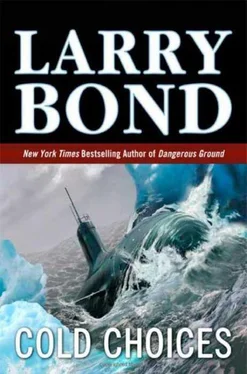Kurganov added, “ Rudnitskiy will join you as well. She has divers for the underwater work.”
“What about cushioning the impact?” Lindstrom asked. “We could construct a framework of timbers that would fit over your bow. My men could fabricate it on deck while others are cutting away the arrays and their mountings.”
“How long?” Rudel asked.
“No longer than it takes to remove the sonar structure,” Lindstrom answered. He looked to the side and spoke in Norwegian. “And we’ve just started.”
The two Russians spoke briefly, then Borisov said, “We assume you will also be reinforcing your pressure hull.”
Rudel shrugged. “We will do what we can, but space is limited.”
Borisov spoke again, smiling. “I noticed during my visit to Seawolf that the shoring in your electronics space was wooden, with brackets spot-welded in place.”
“That’s correct.”
“Russian damage-control shoring is steel, in prefabricated sections, with threaded brackets on the end to ensure a snug fit. Would they be of use to you?
Rudel smiled. “I’d gratefully accept them, gentlemen.”
“Can this be done in time?” Kurganov asked. “On our boats the main hydroacoustic array and its mounting weigh over ten tons.”
Rudel answered, “Things come apart a lot faster than they go together.” He smiled. “And we don’t have to worry about being neat.”
Severodvinsk
Petrov hadn’t expected a call from Borisov so soon. It had been only an hour or so since the last conversation. The final good-byes would come later, so he assumed the admiral wanted to ask about the carbon dioxide levels. Useless, really, but there was nothing else to do.
“Captain Petrov, prepare to get your men back into the escape chamber.”
“What? I just finished getting my men out of it. They will be much more comfortable in the hull.”
“Rudel has a plan to right your boat.” Borisov started describing it, but Petrov grasped it almost immediately, and cut off the admiral. “Is he insane? Have you all lost your minds? We don’t need another boat next to us.”
“He is convinced this will work, and he has convinced all of us as well: Lindstrom, Patterson, everyone. Work has already started.”
“Can I speak to him?” Petrov asked.
“Seawolf is already surrounded by other vessels. With all the noise, I doubt if her underwater telephone would even function. You should see it, Aleksey. It would amaze you. Foreign vessels, including a Russian salvage and rescue ship, surround an American nuclear submarine preparing it for this effort. Workers from three countries cover the bow like ants. And there are over half a dozen divers underwater right now with their cutting torches blazing, a dozen more standing by.”
Borisov’s description fired his imagination. Petrov’s first surprise had worn off, and his mind had begun to consider the plan more dispassionately. Would it work? The problem with believing in that plan was that Petrov and his men had already begun to accept their fate. He didn’t know if they could hope again, or withstand the fear that came with it.
The admiral described Rudel’s plan in more detail, and explained, “You must move up into the chamber as soon as you can, while your men still have the strength to do so.”
Petrov answered, “Some of them have taken sedatives. I’ll have to see what Balanov can do to rouse them. And the extra activity will drive the carbon dioxide levels even higher.”
“We’ve factored that into our calculations. And we’ll need hourly updates, to check those figures.”
“You’ll have them, Admiral. And tell Rudel to make a careful job of it. No rushed work. That’s when accidents happen.”
The White House
President Huber didn’t mind the budget meeting being interrupted, but he had a vital meeting with an industry group in fifteen minutes that he couldn’t ignore. Wright had insisted the call was extremely urgent.
“Sir, I’ve just spoken with Dr. Patterson. There’s to be another attempt to save the Russian sub.”
“What?” Huber’s voice showed more confusion than was expected from a chief executive. “You told me not half an hour ago that there was nothing more to be done. My people are working on a statement of condolence now.”
“They still need two statements. They are making hurried preparations now, and should be ready in about six or seven hours. Petrov and his men could begin to lose consciousness in as little as eight.”
“That’s cutting it a little close,” Huber observed.
“It’s a last-minute thing, Mr. President.” He described how Rudel would use Seawolf to push Severodvinsk upright. “And the Russians are completely on board. There is some risk, sir, but Dr. Patterson says she’s been reassured by Rudel and other qualified engineers that everything will be done to reduce it. And no, she doesn’t have a number.”
“I asked her to keep me informed,” Huber grumbled.
“And she’s doing so, sir.”
“And like before, the only control I have is to order her to stop.”
“You could give that order, sir. You took control of the situation by sending good people.”
“And they’ll try in six hours?”
“That’s the estimate as of now, sir. If this works, it will be successful immediately.”
“Keep me informed.”
Halsfjord
Rudel and Shimko stood on the aft deckhouse, looking down at the fantail. The Norwegian rescue ship had enough room aft to land a large helicopter. Now the floodlit surface was cluttered with men and a gridwork of timbers. The heavy lengths of wood were carried aboard the rescue ship for just such a circumstance. A strong framework could be quickly assembled to reinforce a damaged ship, or construct a cofferdam.
Rudel could see that the box-frame-like structure was well along. Lindstrom explained how it would be attached to the hull. “The welders will attach plates at the front edge of the hull. Stubs on the edge of the framework will be attached with simple pins to those plates. After you’re done it will be simple to detach whatever’s left and cut off the attachment plates.”
“After we’re done,” Rudel muttered. “I like the sound of that.”
“We’ve based it on the blueprints you provided. We will lower it into place and attach it literally in minutes.”
“And it will be ready in time.” Shimko didn’t ask a question, but Lindstrom reassured him. “My chief engineer says they will be finished cutting in two, maybe three more hours. There is a lot of very tough metal to cut through. The framework is actually almost done. Until we need to lift it over to Seawolf, we will reinforce it and improve the design.
“The work on your forward ballast tanks is also proceeding, and will be done in time.”
Rudel answered, “Keeping any air in those tanks at all will be a tremendous help.”
Lindstrom shrugged. “Removing the antisonar coating around the holes is taking time, but as each section is cleared, we start patching it. The patches won’t be completely airtight, of course, but they should help.”
“We’re very grateful,” Rudel said.
Lindstrom grinned. “Don’t thank me. I’m adding all this work to the Russians’ bill.” A shout in Norwegian attracted his attention, and he excused himself, saying “Please, stay as long as you like. I’ll send a messenger when the Russians are ready.”
The two Americans watched the frantic work on Halsfjord’s fantail, then walked over to the port side and looked down at Seawolf. Even though she was lit up by dozens of lights, they could still easily see welding flames and sparks almost covering the bow. The water in front of her glowed with the cutting torches from divers working on the structure underneath, and even more men were at work in the electronics equipment space. Only the Norwegians and Americans were being allowed inside the sub, but there were plenty to do the work.
Читать дальше












